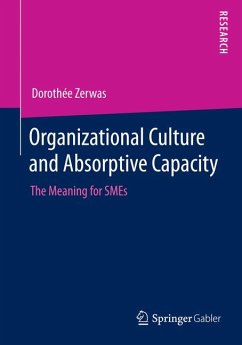Firms are increasingly collaborating with outside partners to access external knowledge that will enable them to successfully innovate and remain competitive in the marketplace. To apply external knowledge, they must have a distinctive capacity to absorb knowledge. One of the main influencing factors for absorptive capacity is a knowledge-friendly organizational culture, because the knowledge absorbing behavior of individuals can be better coordinated through implicit values and norms than through structural coordination instruments. When focusing on an organization's overall behavior, it is important to investigate in detail how a knowledge-friendly organizational culture influences absorptive capacity. Therefore, the author analysis the relationship between organizational culture and absorptive capacity and shows how a knowledge-friendly organizational culture should be designed to support the absorption of external knowledge in SMEs.
Contents
- The Impact, Meaning and Challenges of External Knowledge Absorption
- The Conceptual Principles of Absorptive Capacity and Organizational Culture
- A Model of External Knowledge Absorption
- Implications for a Knowledge-Friendly Culture
Target Groups
- Students and lecturers of innovation management
- Decision makers in knowledge management
The Author
Dorothée Zerwas is a post-doctoral researcher and lecturer at the University of Koblenz-Landau, Computer Science Faculty, Institute for Management.
Dieser Download kann aus rechtlichen Gründen nur mit Rechnungsadresse in A, B, BG, CY, CZ, D, DK, EW, E, FIN, F, GR, HR, H, IRL, I, LT, L, LR, M, NL, PL, P, R, S, SLO, SK ausgeliefert werden.









